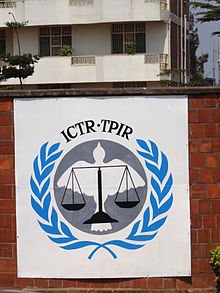
Back المحكمة الجنائية الدولية لرواندا Arabic Ruanda Beynəlxalq Cinayət Tribunalı Azerbaijani Международен наказателен трибунал за Руанда Bulgarian Tribunal Penal Internacional per a Ruanda Catalan Mezinárodní trestní tribunál pro Rwandu Czech Det Internationale Tribunal for Rwanda Danish Internationaler Strafgerichtshof für Ruanda German Tribunal Penal Internacional para Ruanda Spanish دادگاه بینالمللی کیفری برای رواندا Persian Ruanda-tuomioistuin Finnish
| International Criminal Tribunal for Rwanda (ICTR) | |
|---|---|
 | |
 | |
| Established | 8 November 1994 |
| Dissolved | 31 December 2015 |
| Location | Arusha, Tanzania |
| Authorized by | United Nations Security Council Resolution 955 |
| Number of positions | 16 permanent 9 ad litem |
| Website | www |
| President | |
| Currently | Vagn Joensen (Denmark) |
 |
| Part of a series on the |
| Rwandan genocide |
|---|
The International Criminal Tribunal for Rwanda[a] (ICTR; French: Tribunal pénal international pour le Rwanda; Kinyarwanda: Urukiko Mpanabyaha Mpuzamahanga Rwashyiriweho u Rwanda) was an international court established in November 1994 by the United Nations Security Council in Resolution 955 in order to adjudicate people charged for the Rwandan genocide and other serious violations of international law in Rwanda, or by Rwandan citizens in nearby states, between 1 January and 31 December 1994.[1] The court eventually convicted 61 individuals and acquitted 14.[2]
In 1995, it became located in Arusha, Tanzania, under Resolution 977.[3] From 2006, Arusha also became the location of the African Court on Human and Peoples' Rights. In 1998 the operation of the tribunal was expanded in Resolution 1165.[4] Through several resolutions, the Security Council called on the tribunal to complete its investigations by end of 2004, complete all trial activities by end of 2008, and complete all work in 2012.[5] The tribunal had jurisdiction over genocide, crimes against humanity, and violations of Common Article Three and Additional Protocol II of the Geneva Conventions (which deals with internal conflicts).
The first trial, of Jean-Paul Akayesu, began in 1997. Jean Kambanda, interim Prime Minister, pleaded guilty. According to the ICTR's Completion Strategy, in accordance with Security Council Resolution 1503, all first-instance cases were to have completed trial by the end of 2008 (this date was later extended to the end of 2009[6]) and all work was to be completed by 2010. As of 2009, the tribunal had finished 50 trials and convicted 29 accused persons, and another 11 trials were in progress and 14 individuals were awaiting trial in detention; but the prosecutor intended to transfer 5 to national jurisdiction for trial. 13 others were still at large, some suspected to be dead.[7] The United Nations Security Council called upon the tribunal to finish its work by 31 December 2014 to prepare for its closure and transfer of its responsibilities to the International Residual Mechanism for Criminal Tribunals (IRMCT or Mechanism) which had begun functioning for the ICTR branch on 1 July 2012.[8] The Tribunal was officially closed on 31 December 2016.
The tribunal's failure to prosecute war crimes committed by the Rwandan Patriotic Front or try RPF leader Paul Kagame was widely criticized, to the point of being characterized as "victor's justice".[9][10][11][12][13][14][15]
Cite error: There are <ref group=lower-alpha> tags or {{efn}} templates on this page, but the references will not show without a {{reflist|group=lower-alpha}} template or {{notelist}} template (see the help page).
- ^ United Nations Security Council Resolution 955. S/RES/955(1994) 8 November 1994.
- ^ International Justice Resource Center (7 February 2010). "ICTR". Retrieved 2 May 2023.
- ^ United Nations Security Council Resolution 977. S/RES/977(1995) 22 February 1995.
- ^ United Nations Security Council Resolution 1165. S/RES/1165(1998) 30 April 1998.
- ^ United Nations Security Council Resolution 1824. S/RES/1824(2008) page 1. 18 July 2008.
- ^ "Rwanda genocide court says mandate extended to 2009". Reuters. July 29, 2008 – via uk.reuters.com.
- ^ "ICTR - Status of Cases". Archived from the original on 2009-07-21. Retrieved 2010-04-13.
- ^ "ICTR Expected to close down in 2015 | United Nations International Criminal Tribunal for Rwanda". unictr.irmct.org.
- ^ Peskin, Victor (2005). "Beyond Victor's Justice? The Challenge of Prosecuting the Winners at the International Criminal Tribunals for the Former Yugoslavia and Rwanda". Journal of Human Rights. 4 (2): 213–231. doi:10.1080/14754830590952152. S2CID 143431169.
- ^ Keith, Kirsten MF (2009). "Justice at the International Criminal Tribunal for Rwanda: Are Criticisms Just". Law in Context: A Socio-Legal Journal. 27: 78.
- ^ Haskell, Leslie; Waldorf, Lars (2011). "The Impunity Gap of the International Criminal Tribunal for Rwanda: Causes and Consequences". Hastings International and Comparative Law Review. 34 (1): 49. ISSN 0149-9246.
- ^ Humphrey, Michael (2003). "International intervention, justice and national reconciliation: the role of the ICTY and ICTR in Bosnia and Rwanda". Journal of Human Rights. 2 (4): 495–505. doi:10.1080/1475483032000137084.
- ^ Schabas, William A. (2010). "Victor's Justice: Selecting Situations at the International Criminal Court". John Marshall Law Review. 43: 535.
- ^ Reydams, Luc (1 January 2013). "Let's Be Friends: The United States, Post-Genocide Rwanda, and Victor's Justice in Arusha" (PDF). doi:10.2139/ssrn.2197823. SSRN 2197823.
{{cite journal}}: Cite journal requires|journal=(help) - ^ Morrill, Hanna (2011). "Challenging Impunity - The Failure of the International Criminal Tribunal for Rwanda to Prosecute Paul Kagame". Brooklyn Journal of International Law. 37: 683.
© MMXXIII Rich X Search. We shall prevail. All rights reserved. Rich X Search